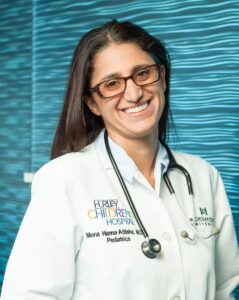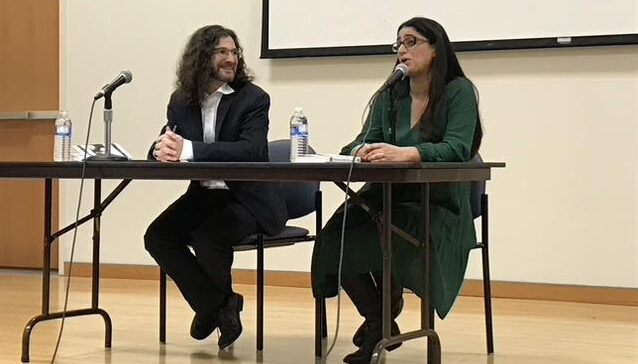“We cannot close our eyes to injustice.” Dr. Mona Hanna-Attisha Gives the 2020 Susman Lecture
Dr. Mona Hanna-Attisha, the pediatrician who gained national prominence by exposing the Flint, Michigan water crisis in 2015, presented ALBA’s annual Susman Lecture to a packed auditorium on the Wayne State campus in Detroit, Michigan on January 27.
Billed as a conversation with the local hero, the event attracted a large crowd of students, faculty, and members of the community who travelled from across Michigan to see Dr. Mona (as most people in the area know her). I had the pleasure to join Dr. Mona on stage to ask her questions about history, social justice, and the future of public health in Flint. Many audience members knew of her fight to save Flint’s children from the news that had gripped metro Detroit over the last few years and her New York Times best-selling book, What the Eyes Don’t See: A Story of Crisis, Resistance, and Hope in an American City.
 Dr. Mona spoke about the origins of the crisis stemming from Flint’s history as the center of the car industry. When General Motors left Detroit, the city’s majority African American resident population was faced with a shrinking tax base and growing poverty. Rick Snyder, then Michigan’s governor, imposed an emergency manager on the city who had the power to do away with agreements decided by democratically elected officials. To save money, in 2014 the emergency manager switched Flint’s water source from Detroit to the Flint River, whose waters quickly corroded the city pipes, exposing its residents to high rates of bacteria and lead (a neurotoxin) and unleashing an environmental and public health disaster. When Dr. Mona discovered these dangerously high lead levels in the fall of 2015, she and her allies fought local and state administrations armed with her own research of local children’s blood levels.
Dr. Mona spoke about the origins of the crisis stemming from Flint’s history as the center of the car industry. When General Motors left Detroit, the city’s majority African American resident population was faced with a shrinking tax base and growing poverty. Rick Snyder, then Michigan’s governor, imposed an emergency manager on the city who had the power to do away with agreements decided by democratically elected officials. To save money, in 2014 the emergency manager switched Flint’s water source from Detroit to the Flint River, whose waters quickly corroded the city pipes, exposing its residents to high rates of bacteria and lead (a neurotoxin) and unleashing an environmental and public health disaster. When Dr. Mona discovered these dangerously high lead levels in the fall of 2015, she and her allies fought local and state administrations armed with her own research of local children’s blood levels.
Dr. Mona also talked about her great uncle, Nuri Rafail Kutani, who inspired her devotion to social justice and to medicine. As she wrote in the September 2019 issue of The Volunteer, Kutani devoted his life to social justice. While studying at MIT in Cambridge, Massachusetts, in the early 1930s, he became radicalized. Soon after, he was expelled from the university and sent back to Iraq where he organized the Association Against Imperialism and Fascism. He was one of just two Iraqis to fight with the International Brigades in Spain. Nuri, Dr. Mona explained, was a looming figure in her family’s history—someone who devoted his life to justice and “even had a tattoo, which was actually a tattoo of the symbol of the International Brigades.” It was only while writing the book that Hanna-Attisha and her family were finally able to retrieve Kutani’s file from Spain, where it was catalogued under one of his aliases. For Dr. Mona, the Spanish Civil War offers enduring lessons about to fight for freedom and justice. Her great uncle’s example pushed Dr. Mona to medicine and inspired her response to the health crisis facing Flint’s children.
She also discussed how her family background as reluctant immigrants from Iraq informed her idea of inclusion, which is especially pertinent in today’s political climate. As a child, her parents remained in close contact with friends and family in Iraq but felt that they could not return home under the repressive regime of Saddam Hussein in the late 1970s, which had created a republic of fear and poisoned its own children. Her father showed her a picture of the chemical gas attack against Kurds in northern Iraq of a child killed by Saddam Hussein’s attack. “We were raised as immigrants; we were lucky to be in this country, but we cannot close our eyes to injustice and we had to continue to raise our voices when we could against injustices that were happening.” Dr. Mona told the audience that she had taken an oath to stand up for children but that hers “was also a value system rooted in a long-standing family history of fighting for social justice.”
“How did you stay positive and not give up when you were attacked by city and state officials?” a member of the audience asked. Dr. Mona replied that she did doubt herself, but that she also felt a larger responsibility to the kids of Flint. “It was a choiceless choice,” she said. Once she learned that there was lead in the water, as a pediatrician she felt a responsibility to act. Audience members also asked about what has happened after she exposed the dangerous lead levels. Since 2015, there has been greater attention and more resources devoted to Flint. It will soon join only two other cities in an effort to replace all lead pipes. In addition, Dr. Mona is part of an important initiative to promote healthy nutrition among the children of Flint. There are no grocery stores in Flint and Dr. Mona is leading a program to persuade residents to buy produce at its farmer’s market. She is also bringing more books to Flint’s children. Still, troubles remain. Residents are still on a water advisory warning, meaning that they should still drink bottled water. Meanwhile, city and state officials who knew about the lead levels and did nothing have not been prosecuted. Environmental racism remains strong as well.
Long lines of adoring students and community members waited to talk to Dr. Mona after the event. They spoke about how much Dr. Mona inspired them and how the community continues to seethe over the injustice of the Flint water crisis.
Aaron Retish, a member of ALBA’s Executive Committee, teaches history at Wayne State University.













